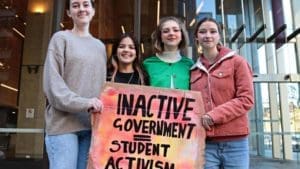
Sri Lanka’s economy is now under immense pressure to crash with the invasion of Ukraine escalating gas prices and the government struggling to recover from the economic downfall caused by COVID-19. Though the crisis is not purely because of these reasons, it is the accumulation of government mismanagement that has been going on for decades.
Nepotism is present in the Sri Lankan government as the Rajapaksa clan occupies several key roles in the government and control 24% of the nation’s money. This has of course sparked public outrage as they believe the family living in luxury is not doing what is best for the nation.
How did the crisis start?
The current prime minister of Sri Lanka, Gotabaya Rajapaksa, issued tax cuts in 2019 which had severely reduced revenues at the time the pandemic equally devastated the economy. It is well-known that Sri Lanka is dependent on foreign affairs and tourism as it makes a large part of the country’s earnings. Rajapaksa has also given substantial amounts of money to China to fund for zealous infrastructure plans, which has affected their ability to repay external debt. Furthermore, the Rajapaksa government banned chemical fertilisers which has impacted agricultural produce of critical crops.
Sri Lankan’s Economic Downfall and People’s Response to It
Sri Lankans are finding themselves amid poverty as price inflation skyrockets and electricity outages grow more and more frequent. Households and business have endured daily power cuts since March with the potential to last to 13 hours and basic food necessities have been notably scarce. Without the money to pay for importation of products, there has been a recent paper shortage where schools had to cancel exams. Hospitals are also running low on essential medicines and have been forced to stop performing surgeries as an extreme.
Thousands of protesters have been reported to be flooding the streets of the capital city, Colombo. They have been holding up signs demanding for the resignation of the President while banging and chanting to traditional music. There have also been reports of protestors setting a bus on fire just outside the residence of the President.
In response to this, the President declared a national state of emergency but has lifted it since many significant parties of the government has resigned due to its failing system. It is apparent that with the tensions of conflict continuing to grow in Europe and the loss of public support, the economy of Sri Lanka may deteriorate.
If you or someone you know wish to discuss this matter further, then please contact our experienced solicitors at 02 8999 9809 for assistance.

There is a common misconception about age being a significant factor when deciding the custody of a child. Surprisingly, age is not as important as one might think. There is no fixed age for when a child can decide which parent to live with during a family dispute. In most cases, there are no opportunities where the child will be the prime assessor in their parental concerns. Instead, only their views are considered amongst other practical factors by the Federal Circuit and Family Court of Australia.
There are two primary considerations that the court will favour when it comes to deciding the custody of a child:
- The benefit to the child of having a meaningful relationship with both of the child’s parents.
- The need to protect the child from physical or psychological harm from being subjected to, or exposed to, abuse, neglect or family violence.
However, under section 60CC(3)(a) of the Family Law Act 1975, it is noted that additional considerations may be any views expressed by the child and factors (such as the child’s maturity or level of understanding). It is important to recognise that the word “wishes” was replaced with the word “views” in 2006 to acknowledge that a child may not be able to boldly express who they want to live with. The word “views” was implemented with intention to capture a child’s perception, perspective, and feelings rather than a single decision.
Other considerations include the nature of the parent’s relationship with the child (including grandparents), the parent’s willingness to encourage the child’s relationship with the other parent and the capacity in which the parent can facilitate for the child’s needs. Moreover, it is not mandatory for the child to express their views if they are unwilling. Any attempts to extract or force their thoughts will regarded to be invalid as coercive behaviour was used to influence the child.
For example, if an eight-year-old is portraying elevated levels of maturity and understanding of the conflict between their parents then the court may place substantial weight on their views. Similarly, if a fourteen-year-old prefers to live with one parent due to bias of money and lack of discipline rather than their better interest with the current primary carer, the court may assess the child to be lacking maturity and stress their views less.
If you or someone you know wish to discuss this matter further, then please contact our experienced solicitors at 02 8999 9809 for assistance.

Law Reform and Society’s Need For It
Law reform is the procedure by which the ruling power amends, updates, or repeals laws to accommodate the changing values, ethics, economic environment, and morals of modern society. An example of law reform in Australia is the enactment of the National Firearms Agreement (NDA)1996 due to the catastrophic aftermath of the Port Arthur Massacre.
Gun Control Laws in Australia
Gun violence is a global contemporary issue that violates one’s right to life. In response to gun violence in Australia, gun control laws were implemented to restrict use of firearms in order to ensure the safety and security of wider society.
Why Did Gun Control Laws Change?
The consequential event of the Port Arthur Massacre prompted a review for the failing existing gun laws in Australia. On April 28, 1996, a mass shooting occurred at the tourist destination of Port Arthur in Tasmania as a man opened fire, killing thirty-five people and injuring eighteen
How Did Gun Control Laws Change?
The National Firearms Agreement 1996 enacted under the Howard government was the sole legislation that changed Australia’s gun laws. It is an agreement between all states that calls for thorough registration and licensing and the prohibition of certain guns. Prior to this agreement, Australia did not have a collective national law for gun control. Instead, matters and practices involving firearms were covered by each state’s negligent systems that disregarded necessary registration. As a consequence of varying laws in states, Australia was weak and inconsistent in tracking gun activity.
Effectiveness of Gun Control Law Reform
The gun control law reform in Australia has been identified as remarkably effective as it reflected society’s ideals of justice for victims and overall public safety.:
-
- Ever since the commencement of the NFA 1996, Australia has seen a decrease in gun ownership as a cause of the federal amnesty collecting up to almost 660,000 newly banned guns in 1996 and an additional 68,727 handguns in 2002.
- In a study conducted by Leigh and Neill in 2010, findings disclose that during the 10 years after the implementation of the NFA there was a 65% decline in firearm homicide and a 59% decline in firearm related suicides.
The improved state laws initiated from the National Firearms Agreement 1996 remains extensively effective in seeing the downfall of mortality rates in Australia, maintaining society’s standard of protection and moral values against gun violence.
If you or someone you know wish to discuss this matter further, then please contact our experienced solicitors at 02 8999 9809 for assistance.

What is Polygamy?
Polygamy involves the practice in which a spouse of either sex can have more than one spouse at a time.
Legality of Polygamy in Australia
Polygamy is illegal in Australia, and this act may not be performed in Australia. A person who marries another, knowing that their previous marriage still subsists will commit an act of bigamy under section 94 of the Marriage Act 1961. The penalty for this offence can be imprisonment of up to 5 years.
In Australia, marriage is defined in the Marriage (Definitions and Religious Freedoms) Act 2017 (Cth) as the union of a man and woman, to the exclusion of all others, voluntarily entered into for life.
Opinions on Polygamy in Australia
Opponents of polygamy highlight the harmful nature it can have towards women. The common practice of polygyny rather than polyandry undermines women’s rights and furthers the gap of gender inequality.
However, proponents for polygamy argue that in circumstances, it may create honesty and transparency in relationships. In 2013, the ‘Polyamory Action Lobby’ submitted a petition to federal parliament, arguing that the illegality of polygamy acts as a “barrier to love”.
Defences to Bigamy
If you think you have committed bigamy, you may be found not guilty if you can prove:
-
- A mistake of fact occurred
- Your spouse had disappeared, and you have reasonable believe that they were deceased
- Your spouse has been missing for at least 7 years and you had no reason to believe they were alive
If you or someone you know wish to discuss this matter further, then please contact our experienced solicitors at 02 8999 9809 for assistance.

Decisions that will impact the course of your entire life are no easy feat. They require extensive thinking, the making of hundreds of pros-and-cons lists and countless conversations. When it comes to making a decision about a career path many teenagers are left with an uncomfortable sense of anxiety. “What if I choose a field that I won’t enjoy later?” “What is corporate life like?” is echoed through the halls of high school every single day. Law has always been a pathway that interested me, so being able to complete Work Experience with Freedman & Gopalan has been an important milestone in the process of career selection.
Throughout the four days I spent working with the kind and patient staff of Freedman & Gopalan, I completed tasks such as archiving, writing articles, organizing files and creating chronologies. These tasks, while they seem mundane, were quite eye-opening to what working as a Solicitor is like. You can’t expect every week and every day to be filled with non-stop exciting work.
While I can’t guarantee that I will end up as a Lawyer in the future, I can certainly thank the staff at Freedman & Gopalan for being generous enough to show me the process of what working in a law firm looks like. The staff at the firm are some of the nicest people I’ve met, and their exceptional professionalism only increased my aspirations to become a Lawyer. Specifically, I want to thank Jasmine for being so tolerant with me and helping me understand each task I undertook.
The decision-making process of career selection is nerve-wracking and clouded with doubts. Whether it is one point added to the pros-column of a list, or the last argument needed to make the final decision – every piece of knowledge about a profession counts. So, a big thank you to the staff of Freedman & Gopalan for the wonderful educational week of Work-Experience!
If you or someone you know wish to gain some work experience at a law firm, then please do not hesitate to contact us on 02 8999 9809.

What is a court-ordered paternity test?
A court-ordered paternity test is a DNA test initiated by the Family Court. They can be initiated due to reasonable doubt about the child’s paternity, or by you applying to the Family Court or Federal Circuit Court.
The purpose is to help settle a child support dispute, determine the paternity of the child in parenting proceedings or any birth certificate dilemmas.
The law on paternity-testing
It may be useful to know that the court can order a paternity test on its own initiative, or upon your request. Section 69W(b) of the Family Law Act 1975 states that a court can make a parentage testing order, on the application of a party.
The Family Law Act 1975 also lays out the presumptions of parentage. Without DNA results, the presumption is that you are a parent of the child if you satisfy the elements list Section 69.
Process of getting a paternity test and the costs involved
The court order will allow you, the other parent and the child to attend a laboratory for DNA testing and collection. The two options available are peace of mind testing or DNA typing. Peace of mind testing involves self-sampling and ranges in price from approximately $150.00 - $200.00. DNA typing is more accredited, however, may cost you from $600.00 - $900.00. It is best to consult our experienced family lawyers who can help you explore your options.
If you or someone you know wish to discuss this matter further, then please contact our experienced solicitors at 02 8999 9809 for assistance.

Currently, Australians everywhere are experiencing the effects of climate change through catastrophic bushfires and extreme flooding. We are in the critical decade for climate action, and this window of opportunity to change is rapidly closing.
In May 2021, a cohort of Australian teenagers sought to fight for climate justice in the Federal Court, and it was found that Federal Environment Minister, Sussan Ley, owed the younger generations a duty of care to prevent climate harm, and consider this duty in approving the mine expansion.
Justice Mordecai Bromberg stated that climate change would be
“the greatest intergenerational injustice ever inflicted by one generation of humans upon the next”.
However this decision was appealed (Minister for the Environment v Sharma [2022]), and the full bench of the Federal Court unanimously rejected the 2021 decision. The current ruling is that Ms Ley does not have a duty of care to protect the younger generations from climate change harm, despite the consisted protesting of young climate activists who argue that expansions would endanger their future and cause injury, ill-health and economic losses.
The primary reason for this ruling was that the control of emissions, and protection of the public from personal injury caused by effects of climate change, were not responsibilities of Members of Parliament (as under current laws). It was also said that there was a “lack of causally connected foreseeable harm… as opposed to a tiny contribution to a sate of overall risk for the future” when approving of mine expansion.
Anjali Sharma (17), one of the young activists, was left devastated by the ruling, however recognised that this is just the beginning of change:
“This case demonstrates that young people are determined to be heard on this issue at the highest levels. We’re proud of representing young people in Australia and fighting to hold people in power responsible for their actions” she says.
Irrespective of the Court’s decision, we should all fight for climate justice and create a safe future for the younger generations.
If you or someone you know wish to discuss this matter further, then please contact our experienced solicitors at 02 8999 9809 for assistance.

Collating Documents
However daunting and tedious, collating documents is the best place to start to help with the rest of the divorce process. Lawyers will require you to provide your marriage and children’s birth certificates, bank account statements, investment statements, loan and mortgage statements and superannuation statements. Other miscellaneous provisions such as insurance policies, tax records, utility bills, property documents and government benefit documents may need to be collected as well.
Dividing assets and caring for children
It is incredibly important to take time to make important decisions. Making a list of the assets you both own and liabilities can make it easier for you to divide your assets. Similarly, time should be taken on how to care for your children. If you are unable to agree on appropriate parenting arrangements following separation, you should seek a qualified Family Dispute Resolution (FDR) practitioner. You should also contact Services Australia to seek more information about the amount of child support payable in particular circumstances, and the benefits that can be claimed for by separated parents.
Domestic Violence
Some divorces may occur due to violence. To protect yourself and your family, call 000 if you are in danger or to retrieve an Apprehended Domestic Violence Order (ADVO) against your partner.
Work out what happens to your income and expenses after divorce
If you pay a mortgage, make sure to speak to your lender and let them know that you are separated. They may allow you to make an application for financial hardship, which reduces mortgage payments to interest only.
Prepare a budget that does not involve your partner, and work out your income and expenses. You can also contact Services Australia to see if you can apply for government financial assistance. You should speak to a family lawyer regarding spousal maintenance, and their obligation to support you financially following the separation. Consulting a family lawyer at our firm can help you formulate a clear plan and understanding of the procedures, reducing stress and ensuring the best outcome for your family.
If you or someone you know wish to discuss this matter further, then please contact our experienced solicitors at 02 8999 9809 for assistance.

International Women’s Day
International Women’s Day yesterday has brought attention and awareness to respects for women’s rights and gender equality. Despite this, domestic violence continues to thrive, with Australian men murdering their female partners at the rate of one a week. Awareness towards domestic violence laws and access to the right legal protections can help prevent the rate at which this occurs.
Forms of Recognised Domestic Violence
Domestic and family violence is a crime defined in the Crimes (Domestic and Personal Violence) Act 2007. It involves an abuse of power, and can extend beyond physical violence, often involving the exploitation of power imbalances and subtle patterns of abuse.
It can take the form of physical abuse such as punching, hitting, kicking and pushing. It can also involve stalking, unwanted sexual acts, breaking Apprehended Domestic Violence Orders (ADVO) or making threats. Recognising the many forms of domestic abuse is vital to ensuring the necessary help is sought.
Lawful Means of Policing Domestic Violence
Domestic violence related legislation allows courts to include a domestic violence protection order, a condition excluding the person against whom the order is made from a residence shared with the victim. Reporting a domestic abuse situation to the police can help retrieve an ADVO on behalf of victims and children that happen to live or spend time with them.
Police can also investigate breaches of ADVOs, and if an ADVO has been breached, the police have power to arrest and lay criminal charges.
Legislation such as the Family Law Act 1975 (Cth) and Family Violence Act 2011 deals with issues regarding protection of partners in marriages, de facto relationships, divorce and separation. It also highlights the maintenance and care of children who fall victim to the consequences of domestic violence. Consult a family lawyer for professional legal advice.
If you would like to learn more about this issue, or would like to discuss a legal matter, please do not hesitate to call us on 8917 8700.
